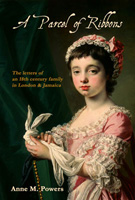Papaver somniferum, Opium Poppy – By Franz Eugen Köhler, Köhler’s Medizinal-Pflanzen via Wikimedia Commons
Sugar, which was so crucial to the development of Jamaica in the eighteenth century, is now something we take completely for granted. It is easy to forget that it was originally such a luxury that it was only available to the very rich, and that apart from flavouring food and conspicuous consumption in medieval sugar sculptures, it was also used as medicine.
There is a long tradition in believing that if something tastes nasty it must be doing you good! Equally it was often the case that if something did taste nasty or bitter it could be made more palatable by being sweetened with honey or sugar.
I came across one reference which highlighted this use of sugar in the Lee family letters, where Frances, who suffered from severe abdominal pain throughout her (long) life, wrote that she found relief by taking ‘Black Drop’ on the advice of the royal doctor Sir Richard Jebb.
Variously known as Kendal Black Drop (and also Lancaster and Armstrong’s Black Drop, and Quaker’s or Toustall’s Black Drop after a certain Dr Toustall of Durham who was said to have invented it) it was made from opium and flavoured with sugar and spices.
Here is a recipe from Henriette Kress’s website – to be followed by qualified herbalists only!
BLACK DROP.—Black, or Quaker’s drop, is variously made; the Edinburgh formula is: Take of opium, 4 ounces; distilled vinegar, 16 fluid ounces. Cut the opium into small fragments, triturate it into a pulp with a little of the vinegar, add the rest of the vinegar, macerate in a closed vessel for 7 days, and agitate occasionally. Then strain and express strongly, and filter.” The aromatics added in some formulae are unnecessary (see also Acetum Opii).
Another popular recipe requiring sugar was Syrup of Poppies used for pain control and as a sedative.
SYRUP OF POPPIES.—A syrup of poppies may be made by depriving of their seeds, poppy-heads, 9 ounces; reduce them to a coarse powder, moisten them thoroughly with diluted alcohol and digest for 48 hours; then transfer the whole to a percolator, and gradually pour upon it diluted alcohol until 2 pints of the filtered liquor are obtained; then evaporate by means of a water-bath to 8 fluid ounces, filter, add sugar, 15 ounces; proceed in the manner directed for simple syrup. When cool, add best French brandy, 2 fluid ounces, and mix (C. W. Epting). (See also Syrupus Papaveris.)
Many medicines were made up in the form of syrups, and pills could be rolled in powdered sugar to make them more palatable. By the nineteenth century when sugar was plentiful doctors would sometimes simply sell sugar pills. Given that a placebo may be effective in about one third of ailments this is not as callous as it may sound, although such a deception is now regarded as unethical.


